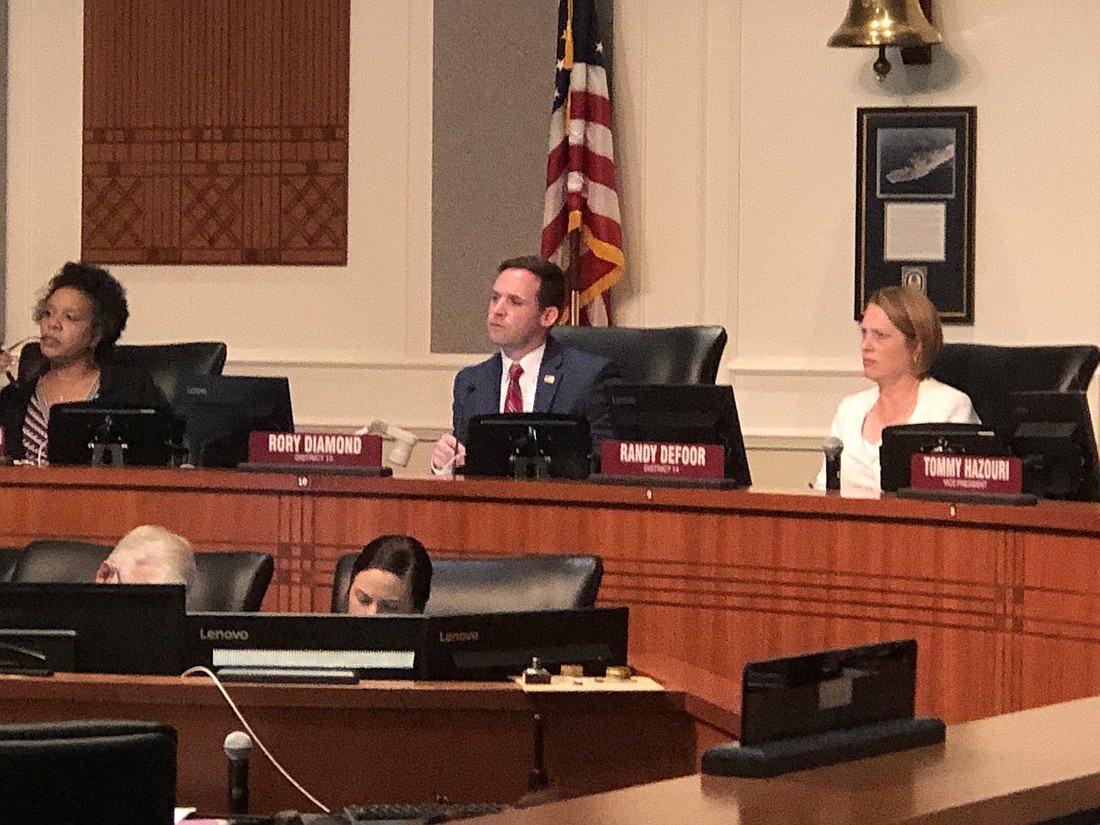
JEA’s attempt to privatize was “maybe the biggest attempt to swindle the people of Jacksonville based on the biggest lie ever told in our city’s history,” City Council member Rory Diamond said at a panel examining the city-owned utility’s canceled invitation to negotiate a sale and employee bonus plan.
Diamond was summarizing two Nelson Mullins Riley & Scarborough attorneys, who testified Feb. 24 to the Council’s Special Investigative Committee on JEA.
It was the second meeting of the three-member panel and the first with testimony from witnesses under oath. The panel comprises Diamond, Brenda Priestly Jackson and Randy DeFoor. The JEA board ended efforts to sell the utility Dec. 24.
Nelson Mullins lawyers Lee Wedekind and Daniel Nunn presented the research their firm sent to Council in a Dec. 26 memorandum. The memo detailed how JEA executives presented “somewhat manipulated data” to show a decline in energy sales, an argument for privatization.
A chart provided to the JEA board in May, June and July by the utility’s management team showed an 8% decline in unit sales from 2006 to 2018.
The attorneys said the chart failed to include the drop in electric sales caused by JEA’s loss of a contract with Nassau County’s public utility to Florida Power & Light Co. in December 2017.
The attorneys said 45% of JEA’s loss in sales from 2006 to 2018 could be attributed to losing the Nassau contract.
After reviewing JEA’s meeting minutes and recordings, Wedekind and Nunn determined that information was never directly presented to the JEA board during strategic planning.
Wedekind and Nunn found that in seven of the past eight years, JEA’s retail energy sales were growing “modestly.”
A slight dip in 2017 was because of mild temperatures and Hurricane Irma, not long-term industry trends, they found. Nelson Mullins found that JEA’s customer base growth was outpacing increases in energy efficiency, which former JEA CEO Aaron Zahn said was causing a faster decline in energy sales.
The law firm’s report matches the finding that the Council Auditor’s Office released Jan. 23.
The Nelson Mullins research was done in preparation for an interview as it sought to win a bid to become Council’s attorney on JEA.
Council chose Smith Hulsey & Busey in December to serve as its outside legal representation, but Nelson Mullins decided to provide its JEA research to the city as a public service.
The Nelson Mullins memo said its attorneys were “deeply concerned about the quality of information management provided to the JEA board in connection with its consideration of the strategic plan.”
The lawyers said, despite JEA’s eight-year net sales increase, utility executives budgeted for a 2.8% decrease in sales for fiscal year 2020.
Given the sales trend, the attorneys called that budgeted decrease “fairly dramatic.”
The attorneys testified that a disclaimer in JEA’s strategic planning presentations said that the sales decline was “not a projection of future financial performance.” The attorneys said the disclaimer was inserted because JEA executives knew the data was inconsistent with what was in the utility’s 10-year site plan and the information executives presented to the Florida Public Service Commission and bond rating agencies.
Bond rating lowered
On Feb. 21, bond rating agency Standard & Poor’s Global announced it lowered its long-term rating on JEA’s water and sewer system revenue bonds to AA+ from AAA.
S&P Global also lowered the long-term rating on JEA’s water and sewer system subordinate revenue bonds to AA from AA+.
“This rating action is based on uncertainty surrounding transparency and independence of both senior management and the board of directors,” S&P Global Ratings credit analyst Edward McGlade said in a news release.
Wedekind and Nunn told DeFoor that JEA management had a “fiduciary responsibility” to present accurate data to the utility’s board.
“In your conclusion, as I understand it, the management presented selective data and projections without property context, to provide a negative and false narrative with the intent to drive the board to a sale. Is that correct?” DeFoor asked.
“Yes,” Wedekind said.
Wedekind said any conclusion of fraud he would leave to the court system, but he said the Nelson Mullins conclusion does justify the JEA board’s Jan. 28 decision to fire Zahn with cause.
Bonus Plan
The committee also heard sworn testimony Feb. 24 from JEA Director of Employee Services Patricia Maillis.
Maillis is responsible for developing and implementing JEA’s compensation policy and told the committee she felt left out of the process to finalize and implement JEA’s abandoned employee bonus plan, the Long-term Performance Unit Plan.
The Council Auditor’s Office issued a memo Nov. 18 that said the bonus plan could cost JEA up to $636.6 million if the utility is sold to a private company. The JEA board killed the plan Dec. 17.
Diamond showed a PowerPoint presentation slide with information on the bonus plan from third-party advisory firm Willis Towers Watson that was given to the JEA compensation committee last year.
Diamond said language in the slide was altered to say stock-options style plans are “selectively” used by public power utilities. An earlier version said the plans are “rarely used.”
In her testimony, Maillis said Zahn’s office asked for a PowerPoint version of the report before the presentation and before the edit appeared.
She told the committee that JEA leadership knew the stock-option style plan was not typical for a government-run agency or public employee compensation plan.
Maillis testified that she didn’t know the JEA board was voting to create a long-term bonus plan until July 23, the day of the vote.